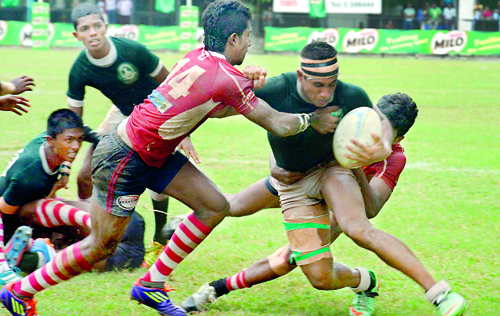The art of winning is science and five hundred rupees is a shouting pass
View(s):The science of winning was not on the cards for Science College at the semi-final of Milo Schools Knockout against Isipathana College. They led till the end of the first half but wilted under the pressure exerted by Omalka Gunaratne, the Pathana dynamo. Science scared Isipathana for the first half of the Schools Knockout Trophy semi-final match. And they were worried as a threat was made to abandon the match by a schools official who did not agree to the crowd sledging the Science bench. In the other semi-final Royal College mauled and rolled over Trinity College and won at the last minute to enter the Schools Knockout final. Trinity and Royal set in a mould of tradition seem to be in recent times taking the game down the drain as spectator hullabaloo was witnessed after the semi-final or the third outing both schools met besides the Bradby Shield encounters.
 Today arch rivals Isipathana meet Royal in the final and at the Royal Complex. Both schools never give a quarter away when they meet and the final will be an event that will be talked about. This brings me to ask whether spectators are to be ‘entertained’ or do they amuse themselves. If rugby owes entrainment to its spectators, can the laws of rugby as it is framed and defined ably to provide the entertainment. The provision of entertainment in a game lies in that laws are open for interpretation that makes it a great sport. On the other hand does rugby have to make the laws simpler for the game to flow with the referee having little to whistle as there will be less to stop? That is if the spectator expects rugby to please him.
Today arch rivals Isipathana meet Royal in the final and at the Royal Complex. Both schools never give a quarter away when they meet and the final will be an event that will be talked about. This brings me to ask whether spectators are to be ‘entertained’ or do they amuse themselves. If rugby owes entrainment to its spectators, can the laws of rugby as it is framed and defined ably to provide the entertainment. The provision of entertainment in a game lies in that laws are open for interpretation that makes it a great sport. On the other hand does rugby have to make the laws simpler for the game to flow with the referee having little to whistle as there will be less to stop? That is if the spectator expects rugby to please him.
Rugby on the field entertains some but not those who comes to see a referee and gets satisfaction shouting at him. Otherwise how come he sees so much of the referees if he was following the game? There is so much reward in rugby for the followers if they invest time in getting to know the rules. There are many who can enjoy rugby without knowing the intricacies of the ruck, maul and scrum.
That is when you disagree to what you see the whistler doing because it looks simple from outside. They shout when anything goes against their team and whine if my boys lose. Former Sri Lanka captain Sajith Mallikarachchi explained: they will be back again next week shouting knock on, forward pass, offside as this is their entertainment. He believes that referees should not take serious note of the shouting as that is their entertainment and that is what they want after paying 500 rupees to watch a game of rugby for 80 minutes. That is the philosophy of rugby for those numbers who keep coming week in week out and especially for schools rugby.
Adding to that I would say the satisfaction of some coaches in shouting, making gestures and gesticulating is also a part of entertainment provided specially for the old boys who fund their existence. So why are the referees getting so agitated when some accuse them of not knowing the laws or being blind and or abuse then after a game. Internationally there is a difference when Roman Poite referees as against Nigel Owens.
Common phrases that you hear during a game are ‘offside’, ‘holding on’, ‘send him off’. Listening to these shouts I now think that they are thoroughly enjoying themselves as they believe the referee has not seen but they have. Let us look at the tackle and how well does a referee do when it comes to his obligations at the tackle? Consider the four key points, tacklers release/move; tackled player release/move; arriving players on their feet and through the gate. Why then are referees making mistakes as spectators think they are.

The Milo Schools Knockout Tournament which ends today, provided entertainment for many and could have been a learning platform for some
Let us take an actual scenario at the tackle. The priority of the referee is ‘did the tackler release the tackled player and move away from the tackled player and the ball immediately?’ This is what will go on in the mind of the referee and if you do not do what is required he will penalise. First it will be the tackler not releasing the tackled player. The crowd and the bench then react. I guess there will always be debate about such instances: some would say: “yeah, look, he’s trying to get out of there!” Others would disagree, and in reality he could probably have moved away a little faster.
If the referee decides, tackler released and moved away, he will then ask himself is the ball carrier making the ball available and move away. The referee did not think so and penalises and then the crowd goes “did not have time to release the ball” and the fun begins. Then the referee goes on to see whether the arriving players entered through the gate and again the ‘ooh and aah’ counters would start.
If this too is fine the question next will be the players who go to ground. The referee does not think they were on their feet and bleep goes the whistle. “Hey referee that fall was not intentional. The player can go down and protect the ball” and then “come on referee he just fell over”. To referee is much easy so why not help in the entertainment and be a referee, and together there are 22 laws that are in the law book of which at least 19 are applicable on the field.
* Vimal Perera is a former Rugby Referee, Coach and Accredited Referees Evaluator of IRB


